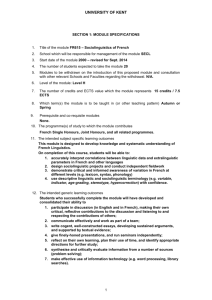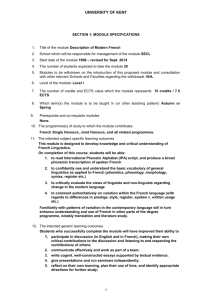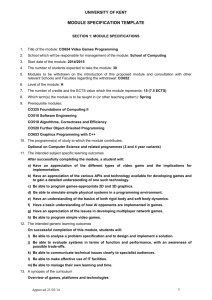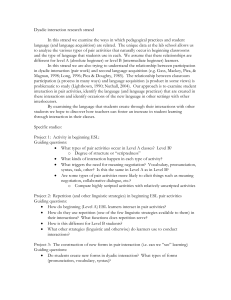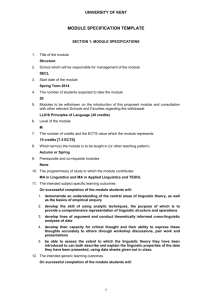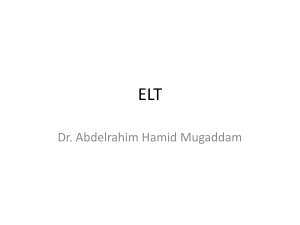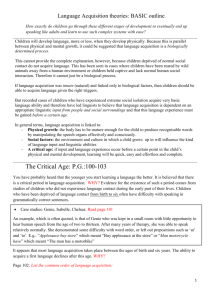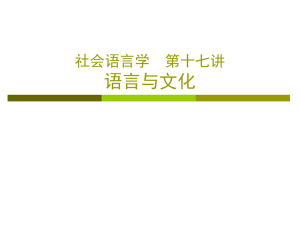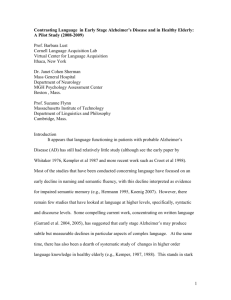University of Kent at Canterbury
advertisement
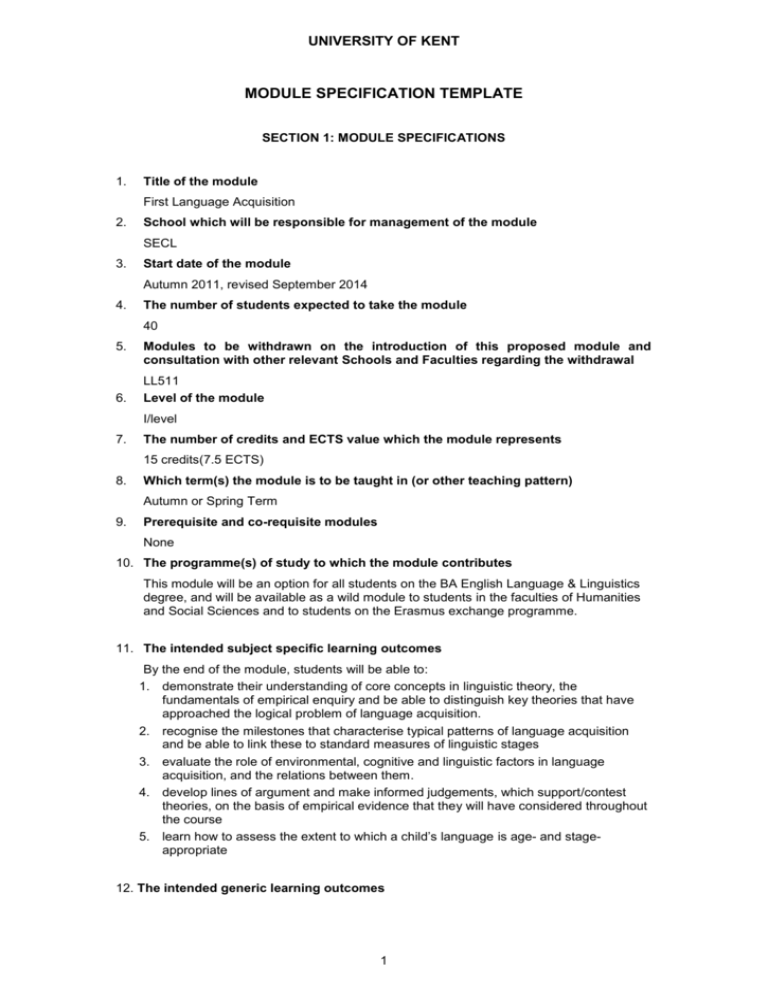
UNIVERSITY OF KENT MODULE SPECIFICATION TEMPLATE SECTION 1: MODULE SPECIFICATIONS 1. Title of the module First Language Acquisition 2. School which will be responsible for management of the module SECL 3. Start date of the module Autumn 2011, revised September 2014 4. The number of students expected to take the module 40 5. 6. Modules to be withdrawn on the introduction of this proposed module and consultation with other relevant Schools and Faculties regarding the withdrawal LL511 Level of the module I/level 7. The number of credits and ECTS value which the module represents 15 credits(7.5 ECTS) 8. Which term(s) the module is to be taught in (or other teaching pattern) Autumn or Spring Term 9. Prerequisite and co-requisite modules None 10. The programme(s) of study to which the module contributes This module will be an option for all students on the BA English Language & Linguistics degree, and will be available as a wild module to students in the faculties of Humanities and Social Sciences and to students on the Erasmus exchange programme. 11. The intended subject specific learning outcomes By the end of the module, students will be able to: 1. demonstrate their understanding of core concepts in linguistic theory, the fundamentals of empirical enquiry and be able to distinguish key theories that have approached the logical problem of language acquisition. 2. recognise the milestones that characterise typical patterns of language acquisition and be able to link these to standard measures of linguistic stages 3. evaluate the role of environmental, cognitive and linguistic factors in language acquisition, and the relations between them. 4. develop lines of argument and make informed judgements, which support/contest theories, on the basis of empirical evidence that they will have considered throughout the course 5. learn how to assess the extent to which a child’s language is age- and stageappropriate 12. The intended generic learning outcomes 1 UNIVERSITY OF KENT By the end of the module students will be demonstrate: 1. written and spoken fluency developed through essays and group discussions 2. communicative development furthered by pair work (where each student might need to defend a particular theory of language acquisition) presentations and general contributions in lectures and seminars. 3. time management skills honed through weekly preparatory reading and informal data analyses during the term 4. a refined capacity for critical thought and the ability to express these thoughts accurately to others 13. A synopsis of the curriculum This course will start by examining the topic of language acquisition, demarcating the domains for linguistic inquiry. It will challenge everyday assumptions about the way in which children acquire language and introduce key theoretical issues, always assessing the validity of each theory on the basis of empirical evidence. The course will examine the biological basis of language and its localisation and lateralisation, using evidence from both typical and atypical populations. It will evaluate the role of input in language acquisition and the extent to which this facilitates linguistic development. All these issues will be set against an understanding of the normal stages of language acquisition, essentially mapping out the linguistic milestones reached by typically developing children to the age of four. An understanding of the interaction between the components involved (phonology, morphology, semantics, rudimentary structure, pragmatics) will provide the empirical backdrop to assess the efficacy of theoretical models introduced. The course will end, having laid the foundations for students to undertake a higher level of research in this area. 14. Indicative Reading List Core: Aitchison, J (2011). The Articulate Mammal. Unwin Hyman Boysson-Bardies (2000) How Language Comes to Children. Bradford Books Cattell, Ray (2007) Children’s Language: Consensus and Controversy. London: Cassell. Further: Foster-Cohen, S (1999) An Introduction to Child Language Development. London, New York: Addison Wesley Longman Fromkin, V and Rodman, R. (1993) An Introduction to Language. Harcourt Brace Jovanovich College Publishers. Peccei, J. S (1999) Child Language. London: Routledge Pinker, S. (1994) The Language Instinct. Penguin. 15. Learning and Teaching Methods, including the nature and number of contact hours and the total study hours which will be expected of students, and how these relate to achievement of the intended learning outcomes This module will be taught in two sessions, consisting of one hour long lecture and one hour long workshop for ten weeks. The lecture will address key linguistic theories and concepts (learning outcomes 11.1- 3), while the workshops will provide for practical investigations of the topics introduced in the lectures (learning outcomes 11.4-5, 12. 14). Total contact hours: 20 Total study hours: 150 2 UNIVERSITY OF KENT 16. Assessment methods and how these relate to testing achievement of the intended learning outcomes 100% coursework: 1. In-class test (50 minutes): 40% 2. Presentation (10 minutes): 20% 3. Essay (1500): 40% The in-class test and the essay will assess students’ knowledge and understanding of the material as well as their ability to recognise practical issues that arise when transcribing child data. (learning outcomes 11.1-5). The mark for the presentation will reflect students’ ability to engage clearly and effectively in oral discussion and argument (learning outcomes 11.5 and 12.1-4). 17. Implications for learning resources, including staff, library, IT and space Large seminar rooms with computer facilities and large whiteboards are essential. 18. The School recognises and has embedded the expectations of current disability equality legislation, and supports students with a declared disability or special educational need in its teaching. Within this module we will make reasonable adjustments wherever necessary, including additional or substitute materials, teaching modes or assessment methods for students who have declared and discussed their learning support needs. Arrangements for students with declared disabilities will be made on an individual basis, in consultation with the University’s disability/dyslexia support service, and specialist support will be provided where needed. 19. Campus(es) where module will be delivered 1 Canterbury. SECTION 2: MODULE IS PART OF A PROGRAMME OF STUDY IN A UNIVERSITY SCHOOL Statement by the School Director of Learning and Teaching/School Director of Graduate Studies (as appropriate): "I confirm I have been consulted on the above module proposal and have given advice on the correct procedures and required content of module proposals" ................................................................ .............................................. Director of Learning and Teaching/Director of Graduate Studies (delete as applicable) Date ………………………………………………… Print Name 1 Required for information purposes only. Changes of campus will not require re-approval of the module specification. 3 UNIVERSITY OF KENT Statement by the Head of School: "I confirm that the School has approved the introduction of the module and, where the module is proposed by School staff, will be responsible for its resourcing" ................................................................. .............................................. Head of School Date ……………………………………………………. Print Name SECTION 3: MODULE IS PART OF A PROGRAMME IN A PARTNER COLLEGE OR VALIDATED INSTITUTION (Where the module is proposed by a Partner College/Validated Institution) Statement by the Nominated Officer of the College/Validated Institution (delete as applicable): "I confirm that the College/Validated Institution (delete as applicable) has approved the introduction of the module and will be responsible for its resourcing" ................................................................. Nominated Responsible Officer College/Validated Institution of .............................................. Partner …………………………………………………. Print Name ………………………………………………….. Post …………………………………………. Partner College/Validated Institution Module Specification Template Last updated July 2010 4 Date
